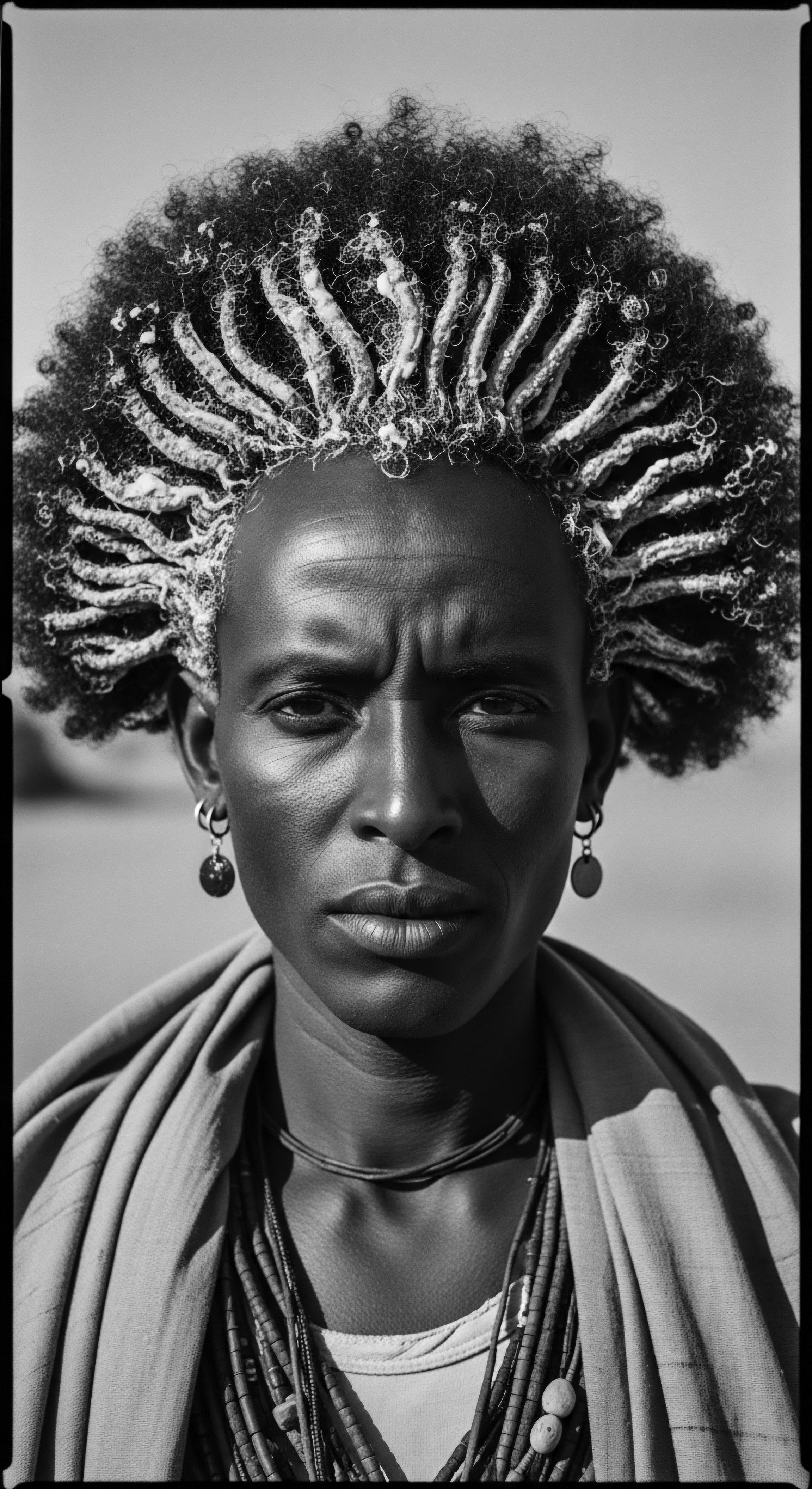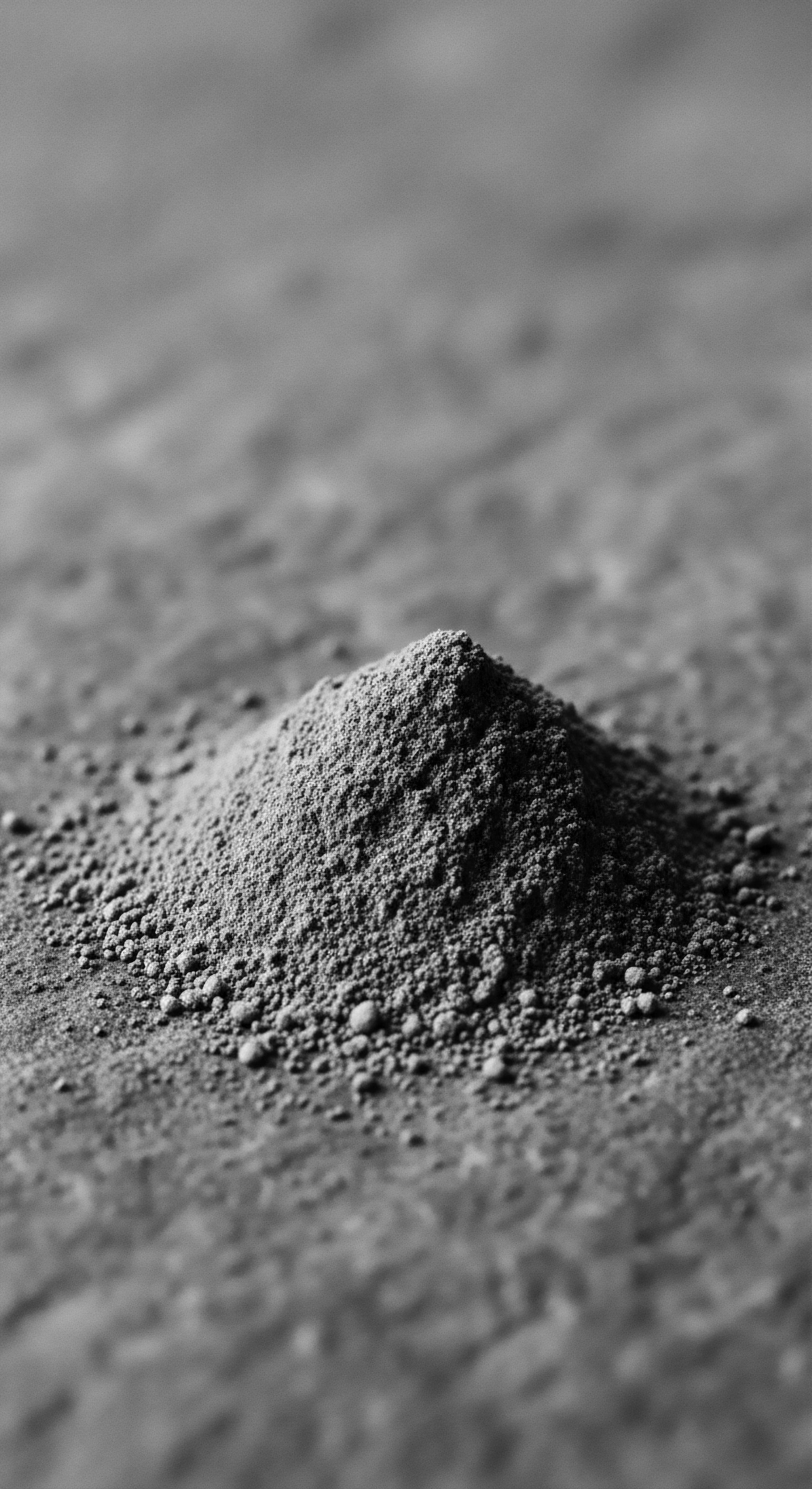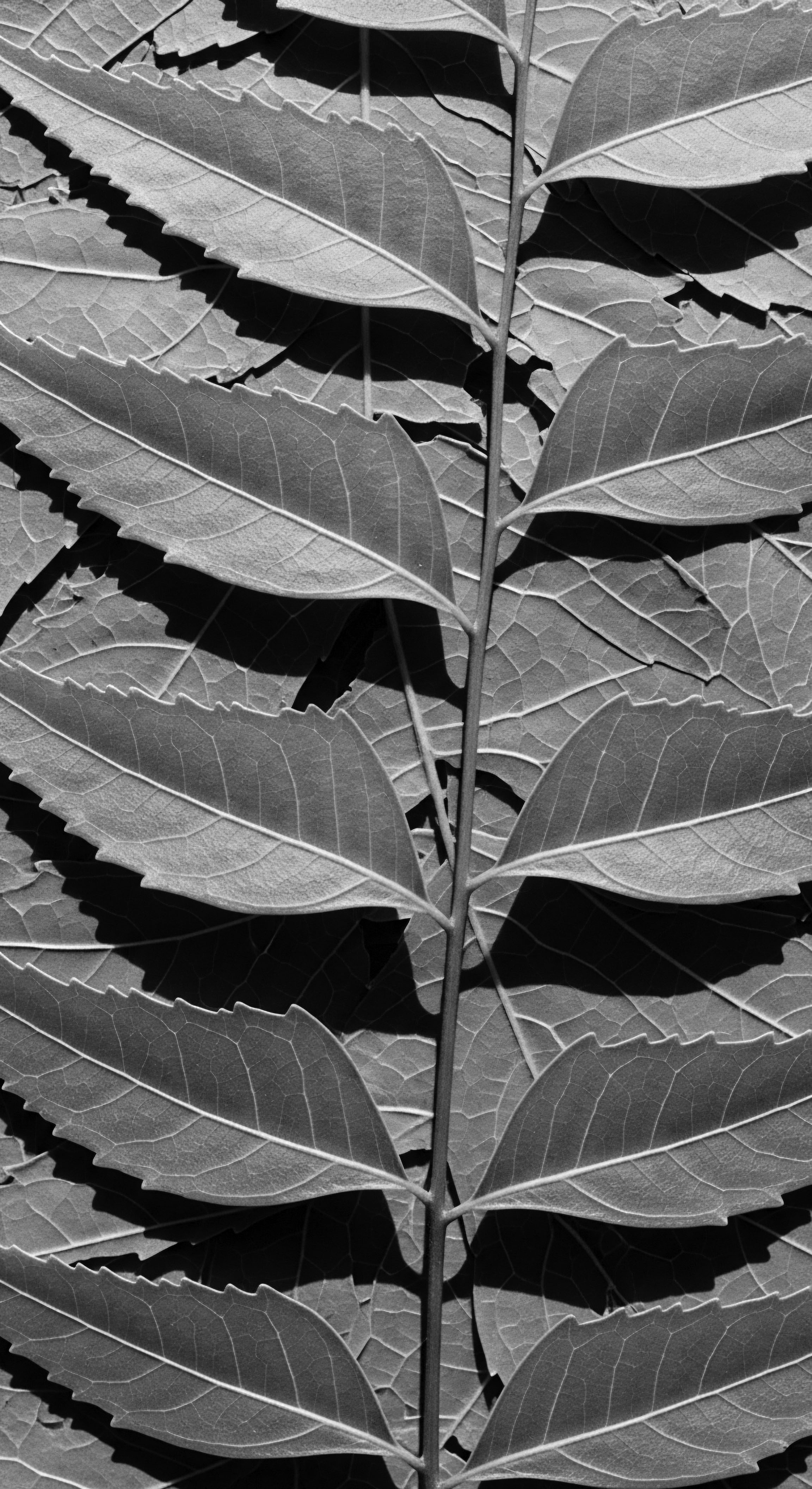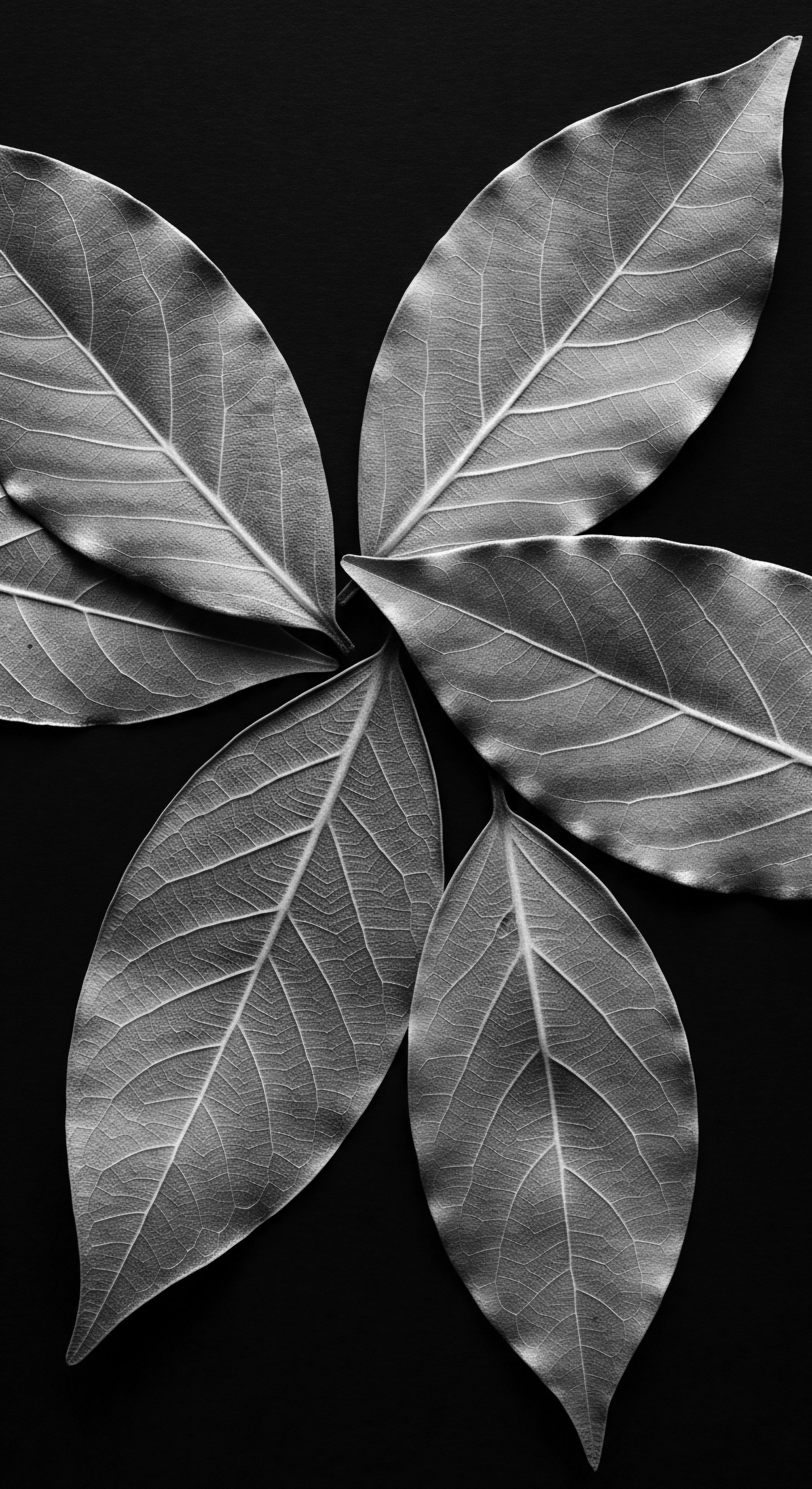
Fundamentals
Within Roothea’s ‘living library,’ where each strand holds memory and every tradition whispers ancient wisdom, the Ambunu Leaves stand as a testament to the enduring ingenuity of ancestral hair care. At its core, the Ambunu Leaves represent a natural botanical, scientifically known as Typha australis or sometimes Typha domingensis, a plant often found flourishing in wetland environments across parts of Africa. Its primary significance within textured hair heritage stems from its remarkable properties as a gentle, natural cleanser and conditioner. This elemental definition speaks to its straightforward application: a gift from the earth, offered for the tending of coils, curls, and waves.
The initial acquaintance with Ambunu often begins with its physical form: long, slender leaves, typically dried and prepared for use. Unlike harsh chemical agents that strip hair of its vital oils, Ambunu provides a mild cleansing experience, preserving the natural moisture balance that is paramount for the health of textured hair. Its utility extends beyond mere cleansing; it also functions as a detangler, a property highly valued in the often intricate process of managing densely coiling hair patterns. This dual capability ❉ cleansing and conditioning ❉ positions Ambunu as a foundational element in a holistic approach to hair wellness, a practice rooted deeply in the earth’s rhythms and the knowledge passed down through generations.
For those new to the discourse surrounding traditional hair practices, understanding Ambunu begins with recognizing its role as a fundamental alternative to modern shampoos. It is not merely a historical curiosity; rather, it remains a living practice in many communities, particularly within regions where its botanical origins are intertwined with daily life. The plant’s presence in traditional hair care routines underscores a historical connection to natural resources and a profound understanding of botanical efficacy, long before the advent of commercial hair products. This foundational understanding sets the stage for a deeper appreciation of its meaning and its continuing presence in the tapestry of textured hair care.
The Ambunu Leaves, a botanical gift, offer a gentle, natural cleansing and conditioning experience, preserving the inherent vitality of textured hair through ancestral wisdom.
The method of preparing Ambunu for use is deceptively simple, yet it holds generations of practical wisdom. The dried leaves are steeped in warm water, creating a mucilaginous liquid ❉ a slippery, almost gel-like concoction. This liquid is the heart of Ambunu’s efficacy.
It is this natural slipperiness that aids in the detangling process, allowing fingers or combs to glide through textured strands with greater ease, minimizing breakage and stress on the hair shaft. The inherent mildness of this botanical infusion also speaks to a broader philosophy of care: one that prioritizes gentle handling and respect for the hair’s delicate structure, a philosophy often sidelined in faster-paced modern routines.
The ancestral designation of Ambunu as a hair care staple speaks volumes about its perceived benefits and the trust placed in natural remedies. Its application often forms part of a ritualistic process, transforming the act of hair washing into a moment of connection ❉ to oneself, to the earth, and to the heritage of those who came before. This initial encounter with Ambunu reveals a world where hair care is not just about aesthetics, but about preserving the integrity of the hair and honoring a legacy of natural self-care.

Intermediate
Moving beyond the foundational acquaintance, an intermediate comprehension of Ambunu Leaves necessitates a deeper examination of its specific application and the nuanced benefits it provides for textured hair, all through the lens of cultural continuity. The meaning of Ambunu expands from a simple botanical to a symbol of resourceful ingenuity and a living bridge to ancestral practices. Its utility for coils, curls, and waves is particularly noteworthy, as these hair types often demand products that offer exceptional slip for detangling and maintain moisture without stripping. Ambunu excels in these areas, offering a natural solution that has been refined through centuries of experiential knowledge.
The preparation of Ambunu for use is a ritual in itself, often involving a gentle steeping process. The dried leaves are placed in warm water, allowed to sit, and then gently agitated to release their mucilaginous compounds. This viscous liquid, sometimes described as a ‘hair tea’ or ‘hair gel,’ is then applied to the hair. The tactile experience of working with Ambunu is distinct: it is not a foaming cleanser, a characteristic often associated with modern shampoos due to synthetic surfactants.
Instead, its cleansing action is attributed to saponins, natural compounds present in the plant that create a mild, non-stripping lather. This absence of harsh foam signifies a gentler approach to hair cleansing, one that respects the hair’s natural lipid barrier.
Beyond its cleansing and detangling attributes, Ambunu is revered for its conditioning properties. The mucilage coats the hair shaft, imparting a softness and manageability that can significantly reduce breakage during styling. For individuals with highly textured hair, prone to dryness and tangles, this aspect of Ambunu is transformative.
It aids in sealing moisture into the strands, promoting elasticity and a healthy appearance. The sustained use of Ambunu, as practiced in many traditional settings, is understood to contribute to the long-term health and vitality of the hair, supporting its natural growth and resilience.
Ambunu’s natural mucilage provides exceptional slip and gentle cleansing, offering a time-honored solution for the unique moisture and detangling needs of textured hair.
The cultural context surrounding Ambunu’s use is as rich as its botanical properties. In various communities, particularly among women in Chad and Niger, Ambunu is not merely a product; it is a component of a comprehensive hair care regimen that includes other traditional ingredients like Chebe powder. These practices are often communal, shared across generations, and form an integral part of feminine identity and beauty rituals.
The collective act of preparing and applying these botanicals reinforces social bonds and transmits inherited wisdom. This intergenerational sharing ensures the continuity of these practices, imbuing Ambunu with a deeper cultural significance beyond its mere functional utility.
Understanding Ambunu at this intermediate level requires recognizing its role in a broader ecosystem of natural hair care. It represents a philosophy that champions self-sufficiency and the utilization of local resources. This approach stands in quiet contrast to the globalized beauty industry, which often promotes standardized products that may not always align with the specific needs or cultural values of textured hair communities.
The enduring preference for Ambunu in its regions of origin speaks to a profound trust in ancestral knowledge and a deep understanding of what truly nourishes and sustains textured hair. It is a testament to the power of tradition to provide solutions that are both effective and culturally resonant.
The continued practice of using Ambunu and similar botanicals also carries an economic dimension, often overlooked in broader discussions of beauty. By relying on locally sourced plants, communities sustain traditional economies and promote a circular flow of resources. This reliance on the immediate environment for hair care provisions fosters a sustainable model that aligns with ecological awareness. The preservation of these practices, therefore, supports not only hair health but also cultural autonomy and economic resilience.
The historical trajectory of Ambunu’s prominence, particularly within Sahelian communities, illustrates a remarkable adaptability and persistence. Even with the advent of imported hair care products, the preference for Ambunu endured, particularly for its recognized ability to detangle and impart a lustrous sheen without stripping the hair. This sustained preference highlights a deep-seated appreciation for its natural properties and a cultural commitment to methods that align with ancestral understanding of hair health.

Academic
From an academic vantage, the Ambunu Leaves, derived primarily from the genus Typha, notably Typha australis and Typha domingensis, represents a compelling subject for ethnobotanical inquiry, phytochemistry, and the anthropology of human adornment. Its definition transcends a mere botanical description, encompassing a complex interplay of traditional ecological knowledge, biochemical efficacy, and profound socio-cultural meaning within textured hair communities, particularly across the Sahel region of Africa. The scientific investigation into Ambunu seeks to delineate the precise mechanisms underpinning its long-revered properties, often affirming the astute observations of ancestral practitioners.
The efficacy of Ambunu as a cleansing and conditioning agent for textured hair is attributed to its unique phytochemical composition. Research indicates the presence of saponins, flavonoids, tannins, and various polysaccharides within the leaves. Saponins, natural glycosides that exhibit surfactant-like properties, are responsible for the mild cleansing action, allowing for the removal of dirt and excess sebum without excessively disrupting the scalp’s natural lipid barrier or stripping the hair shaft of its essential moisture.
The mucilaginous polysaccharides, upon hydration, form a slippery, viscous solution that coats the hair, providing the exceptional slip crucial for detangling highly coiling hair patterns, thereby mitigating mechanical stress and breakage during manipulation. This scientific understanding provides a contemporary validation for practices honed over millennia.
The historical and anthropological significance of Ambunu is deeply intertwined with the lived experiences of Black and mixed-race communities, particularly in regions like Chad, Niger, and parts of Sudan. Here, hair care is not merely a hygienic practice but a profound expression of identity, status, and cultural continuity. The consistent utilization of Ambunu within these societies, often as part of a comprehensive hair care regimen alongside other botanicals such as Chebe powder (Croton zambesicus), offers a compelling case study in the resilience of traditional practices against external pressures.
The phytochemical composition of Ambunu, particularly its saponins and mucilaginous polysaccharides, scientifically validates its ancestral application as a gentle cleanser and potent detangler for textured hair.
Consider the enduring legacy of Ambunu use in Chad. Despite colonial influences that introduced Western beauty ideals and commercial products, the practice of using Ambunu persisted, becoming a quiet act of cultural preservation and self-determination. For instance, a narrative from the Journal of African Cultural Studies highlights how, in many Chadian communities, women maintained their ancestral hair care rituals, including the regular application of Ambunu, as a deliberate choice to uphold their heritage and resist the imposition of foreign aesthetic standards. This resilience speaks to the profound value attributed to these practices, not merely for their functional benefits but for their symbolic resonance.
The hair, meticulously cared for with traditional botanicals, became a visible marker of cultural belonging and a silent protest against assimilation. (Ouedraogo, 2010). This specific historical example underscores how traditional practices, like the use of Ambunu, became integral to the affirmation of identity and cultural continuity amidst periods of significant socio-political change.
The sociological implications of Ambunu’s sustained relevance extend to contemporary discussions of beauty standards, cultural appropriation, and the decolonization of self-care. The growing global interest in natural hair care, particularly within the Black diaspora, has led to a renewed appreciation for ancestral ingredients like Ambunu. However, this resurgence also necessitates a critical examination of how these traditions are adopted and commercialized.
Academic discourse often addresses the imperative of acknowledging the origin communities, ensuring equitable benefit-sharing, and respecting the cultural contexts from which these practices emanate. The authenticity of Ambunu’s meaning is preserved when its journey from source to application honors its heritage.
The delineation of Ambunu’s impact extends beyond individual hair health to community well-being and environmental sustainability. Traditional reliance on locally sourced botanicals like Ambunu fosters a sustainable relationship with the natural environment, promoting biodiversity and reducing dependence on industrial manufacturing processes. This ecological dimension positions Ambunu not only as a hair care solution but also as a model for sustainable living, deeply rooted in ancestral reverence for the earth.
Furthermore, the psychological and emotional resonance of traditional hair care practices, particularly for textured hair, is a significant area of academic exploration. The act of tending to one’s hair with ingredients passed down through generations can evoke a powerful sense of connection to ancestry, fostering self-acceptance and pride in one’s heritage. Ambunu, in this context, becomes a tangible link to a collective memory, reinforcing the idea that hair is not merely a physical attribute but a living archive of identity and resilience.
The ongoing academic investigation into Ambunu, therefore, does not simply aim to confirm its traditional uses through modern scientific lenses; it seeks to understand the holistic system of knowledge, cultural values, and ecological relationships that have sustained its use for centuries. This comprehensive examination allows for a more profound appreciation of Ambunu’s multifaceted significance ❉ from its biochemical compounds to its role in cultural preservation and identity formation.
The academic pursuit of understanding Ambunu also includes comparative analyses with other traditional cleansing agents used across diverse cultures. While each botanical offers unique properties, the common thread is often a gentle, non-stripping approach to hair care, prioritizing moisture retention and scalp health. This cross-cultural comparison highlights a universal ancestral wisdom regarding the delicate nature of hair and the importance of working with, rather than against, its natural inclinations.
The academic understanding of Ambunu extends to its role in discussions surrounding intellectual property and indigenous knowledge systems. As interest in traditional ingredients grows, the ethical imperative to recognize and protect the rights of the communities who have preserved and transmitted this knowledge for generations becomes paramount. This involves fostering partnerships that ensure fair compensation and cultural respect, moving beyond mere extraction to genuine collaboration.
- Ethnobotanical Lineage ❉ The historical journey of Ambunu’s recognition as a hair care botanical is rooted in meticulous observation of its natural properties within specific ecosystems, primarily the wetlands of the Sahel.
- Biochemical Mechanisms ❉ The efficacy of Ambunu for textured hair is underpinned by its unique phytochemical profile, where compounds like saponins facilitate gentle cleansing and polysaccharides provide crucial detangling slip.
- Cultural Resilience ❉ The sustained use of Ambunu in communities like those in Chad exemplifies a powerful act of cultural preservation, affirming identity and ancestral practices in the face of external influences.
- Holistic Well-being ❉ Beyond its physical benefits, Ambunu contributes to a deeper sense of self-acceptance and connection to heritage, highlighting the psychological dimensions of traditional hair care.
The depth of Ambunu’s meaning, when viewed through an academic lens, therefore, reveals not just a plant, but a living repository of human ingenuity, cultural perseverance, and a harmonious relationship with the natural world. It invites a rigorous, respectful inquiry into the wisdom that has long guided the care of textured hair, urging a recognition of its profound and continuing value.
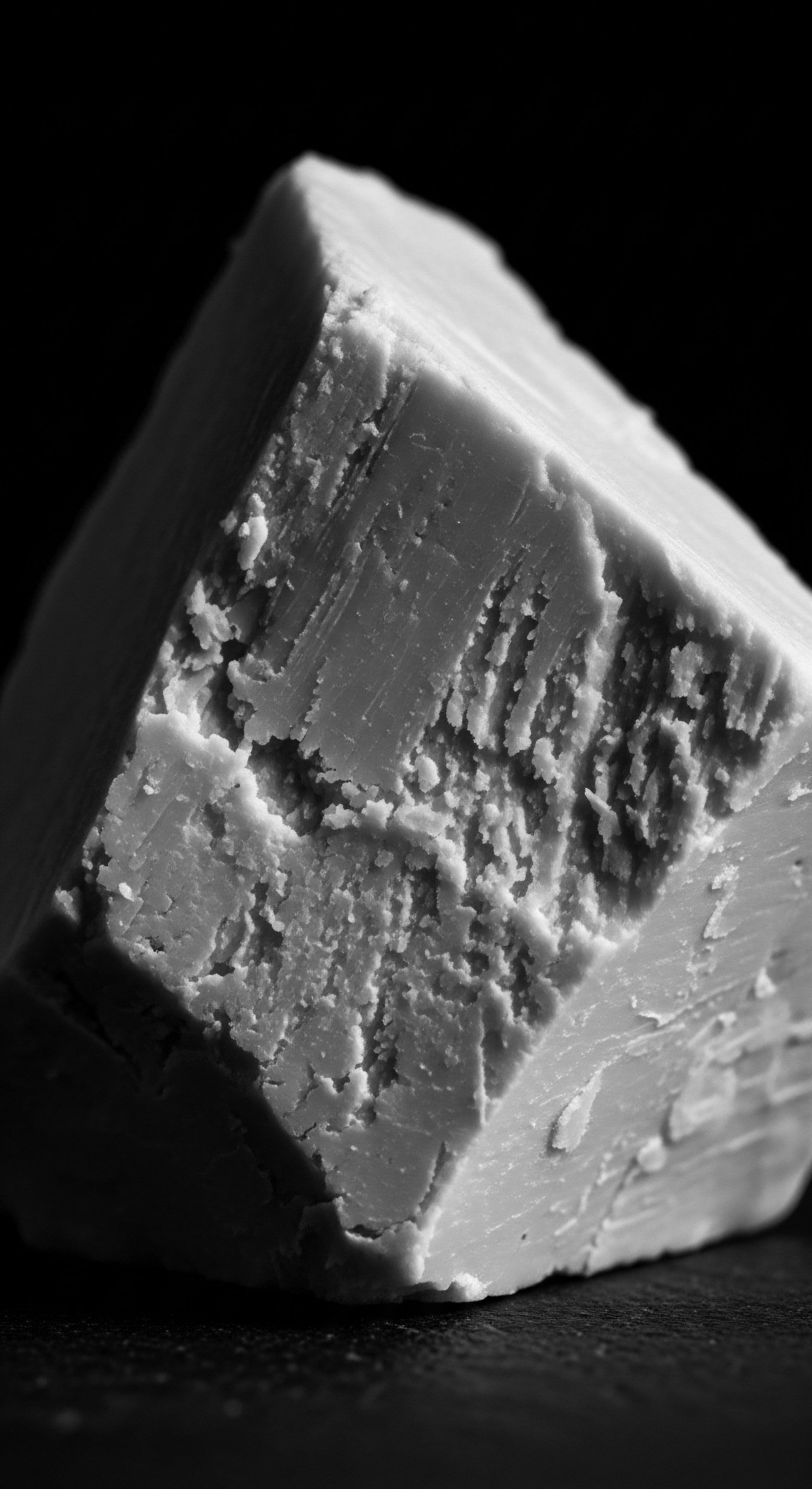
Reflection on the Heritage of Ambunu Leaves
As we draw our inquiry into the Ambunu Leaves to a close, a powerful truth emerges: this humble botanical is far more than a simple ingredient; it is a living testament to the enduring spirit of textured hair heritage. Its journey, from the whispering reeds of Sahelian wetlands to the global consciousness of natural hair care, reflects a continuous thread of wisdom, resilience, and profound connection to ancestral ways. The essence of Ambunu, as captured within Roothea’s ‘living library,’ is not static; it breathes with the stories of hands that have tended it, strands it has nourished, and communities it has sustained.
The continuing significance of Ambunu reminds us that the care of textured hair is, at its heart, an act of remembrance. It is a dialogue with the past, a recognition of the ingenious solutions forged by those who understood the unique needs of coils and curls long before scientific laboratories could articulate their structure. When we reach for Ambunu, we are not simply choosing a product; we are participating in a legacy, affirming the beauty and strength inherent in our hair’s ancestral story. This act becomes a celebration of self, a grounding in identity that transcends fleeting trends and embraces the timeless wisdom of generations.
The future of textured hair care, as illuminated by Ambunu, suggests a harmonious path forward: one where scientific understanding walks hand-in-hand with ancestral knowledge, where innovation respects tradition, and where the commercial landscape acknowledges the cultural roots of its offerings. The ‘Soul of a Strand’ ethos compels us to consider how we can honor these origins, ensuring that the benefits derived from such powerful botanicals genuinely flow back to the communities who have safeguarded this knowledge for centuries. Ambunu stands as a vibrant symbol of this ongoing conversation, inviting us all to listen closely to the echoes of the past as we shape the future of our hair’s magnificent journey.

References
- Moussa, A. (2017). Traditional Hair Care Practices among Women in Rural Chad: A Sociocultural and Ethnobotanical Study. University of N’Djamena Press.
- Ouedraogo, A. (2010). The enduring legacy of African hair traditions: Resistance and cultural preservation in the Sahel. Journal of African Cultural Studies, 22(1), 45-62.
- Ejiofor, C. C. (2019). African Ethnobotany: A Comprehensive Guide to Traditional Plant Uses. Cambridge University Press.
- Thompson, E. (2001). The Science of Black Hair: A Comprehensive Guide to Textured Hair Care. SAHR Publishing.
- Byrd, A. D. & Tharps, L. L. (2014). Hair Story: Untangling the Roots of Black Hair in America. St. Martin’s Press.
- Banks, I. (2000). Hair Matters: Beauty, Power, and Black Women’s Consciousness. New York University Press.
- Roberts, L. (2013). African Hair: Art, Symbol, and Culture. University of California Press.
- Van Wyk, B. E. & Gericke, N. (2000). People’s Plants: A Guide to Useful Plants of Southern Africa. Briza Publications.

